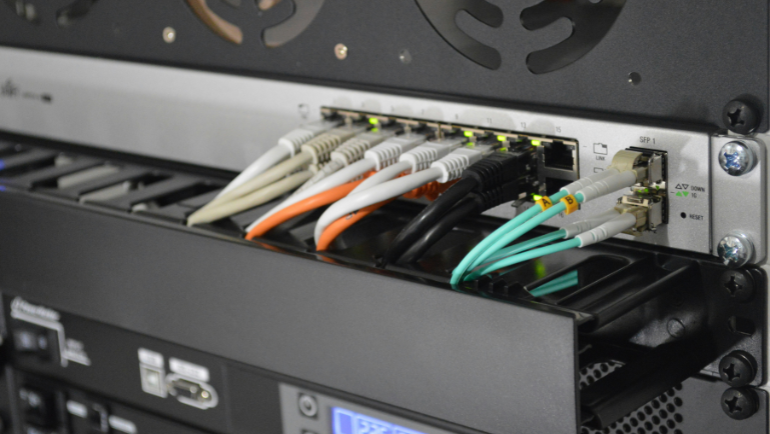
Wi-Fi extender can be a solution to all your connectivity issues within your workspace. Dead zones and limited Wi-Fi coverage are some of the major issues faced by most enterprises. That’s why Wi-Fi extenders are becoming a go-to choice for businesses to mitigate no Wi-Fi areas within a workplace and increase productivity. Here’s an in-depth look at how a Wi-Fi extender can improve your network coverage with better performance and connectivity.
What is a Wi-Fi Extender?
In 2016, Wi-Fi extenders started to gain popularity as the growth of users was exponential, and dead zones were occurring within workspaces. Therefore, TP-Link, Linksys, Netgear, and Google Nest started to invest in extenders.
A Wi-Fi extender is a wireless access point and network-boosting device that allows you to cover a broader area of your office for better interconnectivity. It offers a dual mode of connection (wireless and wired) to expand connectivity throughout the workplace with irregular layouts. Wi-Fi extender It is an independent bridge between your wireless router and the dead zones.
How Does a Wi-Fi Extender Work?
A Wi-Fi extender connects to the primary internet router and amplifies it to a wider area. This ensures your space has a strong stable internet connection wherever you are in the office building. Therefore, buy a Wi-Fi Extender or convert your existing router into an extender to affordably extend your wireless internet connection.
Types of Wi-Fi Extenders
Wi-Fi extender comes in various types to cater to the needs and requirements of different businesses.
External Antennas Wi-Fi Extender
Enterprises opt for extenders and repeaters which are compact devices with fewer ethernet ports and come with external antennas to connect wirelessly. Generally, these are plug-and-play devices with less or very little technical knowledge to install.
Powerline Adapter
Powerline Wi-Fi extenders use your workplace electrical wiring to extend the range of your Wi-Fi network. They come in a kit with two adapters. One adapter plugs into an outlet near your router, and the other adapter plugs into an outlet in the area where you need to extend your Wi-Fi signal. It effectively turns your electrical circuit into a wired network and does not experience network lag in connectivity.
Weather-Proof Wi-Fi Extenders
These extenders are designed especially for outdoor usage where you want to add more coverage. These places include walkways, rooftops, basements, and more.
Router/Extender Combo
This combined device connects to your modem and uses a satellite to receive, amplify, and extend the original WiFi signal. These units share a single network name (SSID) and password, ensuring a straightforward and seamless connection. Additionally, this type of WiFi extender may feature Gigabit Ethernet ports for wired devices and support a faster WiFi standard.
How to Setup and Secure your Wi-Fi Extender
Setting up a Wi-Fi extender is simple and easy to configure. Explore how you can set up your Wi-Fi range extender.
- Choose the right location for your Wi-Fi extender
- Power on the wifi signal extender.
- Open the web browser and enter the IP address that you can find on the back of the extender.
- Change the Network Name/Service Set Identifier (SSID) and password to make sure you keep the same SSID and password as your main router for uninterrupted connectivity.
- Test the connection on multiple devices to ensure internet connectivity around the workplace.
Secure your Wi-Fi Extender
Securing a wireless extender is crucial to maintain the integrity and privacy of your office network. Here are some effective steps to ensure your WiFi extender is secure
- Change Default Administrator Credentials
- Update Firmware regularly
- Use strong encryption like WPA2 or WPA3
- Use strong passwords with a mix of characters, numbers, and alphabets
- Create a Guest Network for outsiders.
Placement of Wi-Fi Extender
Placement of your extender W-Fi plays an important role, these are the parameters that you should keep in mind while placing your extender.
Distance
When there are few obstacles and the router maintains a strong signal it is advisable to position your wireless routers about 25 to 40 feet from the router. The optimal Wi-Fi extender distance with an internal antenna is 20 to 35 feet. This positioning generally ensures the range extender operates effectively.
Vertical Height
Raise the Wi-Fi signal extender at 4 feet from the ground and ensure your main router is at the same altitude as your PC Wi-Fi extender. However, the direction of the antenna is crucial so keep it vertically straight to cover most of the area within your workplace.
Wi-Fi Extender Life Span
The life span of an extender depends on the build quality and the environment where the extender is being installed. If your Wi-Fi router extender is experiencing a high-temperature and humidity environment then its components will degrade quicker. However, keeping your wired Wi-Fi extender in a temperature-controlled environment can increase its life span. Moreover, make sure to get an extender from Top IT hardware Brands to get the best build quality that can last for longer.
Wi-Fi Extender Cost
The pricing and cost of wi-fi range extenders can vary from model to model depending on your requirements and needs. Wi-Fi extender prices range from $45 to $157. The base model is affordable and suitable for most tasks, but higher-priced models offer improved performance. These wireless network devices come from IT brands and Computing Worlds has a range of Wi-Fi extenders that businesses can buy online.
You can also request a bulk quote online for the required Wi-Fi Extenders.
Pros and Cons of Wi-Fi Extender
Wireless devices like WI-Fi extenders have pros and cons like every other technology.
| Pros | Cons |
| Extends Wi-Fi signal range | Shared bandwidth may lead to slower speeds |
| Affordable | Likely to interfere with other electronic devices |
| Dual-band support | Managing multiple extenders can be challenging |
| Multiple antennas for better reliability | Often, a temporary fix for coverage issues |
| flexible placement options | Must be within good range of the router |
Reasons You Need A Wi-Fi Extender
Wi-Fi extender is a useful tool for businesses and enterprises to take a step towards better internet connectivity.
Large Office Spaces
If your office is spread out over a large area, you might encounter dead zones where the internet connectivity is weak. To tackle all these problems Wi-Fi extenders come up as a solution to eliminate dead zones, improve employee productivity, and reduce frustration.
Better Connectivity
Temporary workstations or office collaboration areas may not be within reach of the primary Wi-Fi router signals. Troubleshooting your router or getting an Extenders can provide a quick and easy solution to extend coverage to these flexible workspaces.
Essential Features to Look for When Buying a Wi-Fi Extender
Wi-Fi extender comes with a bunch of features that are designed for your convenience. However, these are the few features that you should consider for the next wireless networking device.
Matching with your Router
Review your TP-Link or Linksys Wi-Fi router model and opt for an extender that has the same specifications as your main router. For instance, if your wireless router supports (802.11x) Wi-Fi 6 then buy an extender with the same configuration to utilize the full potential of your internet connection.
Dual-Bands
Dual-band extenders offer 2.4 GHz and 5 GHz radios, which can provide more options for configuring your network. Choose a range extender capable of operating on both bands simultaneously. This enables it to enhance performance by utilizing different bands for various functions. Likewise, extenders with multiple antennas can transmit and receive at the same time, further improving performance.
AC Outlet Pass Through
AC pass-through Wi-Fi extenders are widely available from most major networking equipment manufacturers. They extend your Wi-Fi signal and include a built-in electrical outlet, so you don’t have to give up a power outlet to use the extender.
Future Trends
Advanced wireless networking devices are coming in and we can expect to see WI-Fi 6E and Wi-Fi 7 integration in the newer models. Additionally, Wi-Fi extenders will be able to optimize network performance based on usage patterns and device requirements with AI Integration. Wi-Fi extenders will also become more power efficient to reduce overall electricity consumption for businesses.
Frequently Asked Questions:
Do Wifi Extenders Work For Gaming?
Yes, with a suitable processor from Intel or AMD for gaming, wifi extenders can work perfectly for gaming and heavy tasks. However, make sure you are utilizing wired Wi-Fi extender mode to experience less lag and latency.
Can you Access your Wi-Fi Router Extender Remotely?
Yes, brands like TP-Link and Linksys provide easy tools to access your router remotely within their admin panel or with mobile applications.
How To Reset A Wifi Extender?
You can reset your extender by pressing the reset button on the device or from the admin panel.
Does A Wifi Extender Increase Speed?
No, you’ll get the same speed from the extender as you are getting from the primary router.
Overall, the extender is a good tool for small and medium-sized businesses (SMBs) with features to cover up dead zones. Wi-Fi extenders offer many security features but considering the increasing number of data breaches, enterprises should secure their wireless router network.
On top, to get a better solution than an extender, enterprises should opt for Mesh Wi-Fi Systems to permanently eliminate all the dead zones within their workplace. Stay connected with the Computing Worlds blog to get updates about the networking world.






